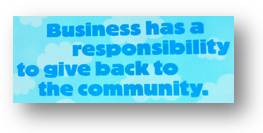Environment
AO2 You need to be able to:
Demonstrate application and analysis of knowledge and understanding Command
Terms: These terms require students to use their knowledge and skills to
break down ideas into simpler parts and to see how the parts relate: Analyse,
Apply, Comment, Demonstrate, Distinguish, Explain, Interpret, Suggest
AO3 You need to be able to: Demonstrate synthesis and evaluation. Command
terms these terms require you to rearrange component ideas into a
new whole and make judgments based on evidence or a set of criteria. Compare,
Compare and contrast, Contrast, Discuss, Evaluate,
Examine, Justify, Recommend, To what extent
AO4 You need to be able to Demonstrate a variety of
appropriate skills. Command Terms These terms require you to demonstrate
the selection and use of subject-specific skills and techniques: Annotate,
Calculate, Complete, Construct, Determine, Draw, Identify, Label, Plot, Prepare
A key area of corporate social responsibility is the impact that a firm has on the environment and this may attract significant media coverage.
There is a tendency to assume that this impact is mostly negative. However, business may have positive impacts on the local environment and national environment. For example, firms fund improvements in the local infrastructure and provide community facilities. They may improve the environment by taking derelict sites and redeveloping these to provide local amenities.
However, much of the focus on this aspect of the external environment will always be on pollution and other negative effects of production. These are called 'negative externalities'. and include:
- Congestion caused on the use of local services - roads etc.
- Noise - noise is also a form of pollution and many forms of business activity are noisy
- Air and water pollution - a side effect of many production processes is pollution of some form, though there are often options to minimise these side effects.
- Use of non-renewable resources - many processes use fossil fuels or other non-renewable resources. These are by their very nature un-replaceable and so will have a serious impact on future economic activity.
 There
are many ways that businesses can reduce the negative effects of their
operations and work with stakeholders to promote more environmentally
friendlier practices:
There
are many ways that businesses can reduce the negative effects of their
operations and work with stakeholders to promote more environmentally
friendlier practices:
To minimise damage to the environment, businesses consider:
- Reducing emissions
- Producing or using lead free fuels and other 'greener' sources of energy, e.g. renewable resources or energies. It is not uncommon for business developments to include sources of wind and solar energy on site.
- Incorporating cleaner production methods in new buildings, plants etc.
To reduce levels of waste they:
- Improve industry re-cycling programmes
- Encourage energy management schemes
- Offer free long-life shopping bags or other bio-sensitive packaging of products
To try to raise environmental awareness, they:
- Ask staff for ideas
- Promote customer awareness and participation
- Publish literature such as sustainability reports
To help protect the environment, they:
- Donate money for environmental projects that directly affect their stakeholders
- Fund or sponsor education programmes
-
 Provide recycling facilities
Provide recycling facilities
To assist the community, they support:
- Tree planting
- Urban re-generation schemes
|
Environmental Issues in Brazil
Brazil is a magnificent
country with a diverse, complex geography. However, like every country in the
world, it has its own set of environmental issues. These threaten different
aspects of the natural abundance and are being addressed by a variety of organisations
and initiatives. The main environmental issues faced by Brazil
include:
|
